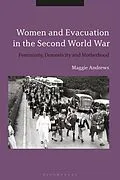Groups of young evacuees, standing on railway stations with gas masks and cardboard suitcases have become an iconic image of wartime Britain, but their histories have eclipsed those of women whose domestic lives were affected. This book explores the effects of this unparalleled interference in the domestic lives of women, looking at the impact on everyday experience and on ideas of femininity, domesticity and motherhood. Maggie Andrews argues that wartime evacuation is important for understanding the experience and the contested meanings of domesticity and motherhood in the 20th century. As this book shows, evacuation represents a significant and unrecognised area of women's war work, and precipitated the rise of competing public discourses about domestic labour and motherhood.
Autorentext
Maggie Andrews is Professor of Cultural History at the University of Worcester, UK.
Inhalt
Introduction
1. Myths, Memories and Memorials of Evacuation
2. Femininity, Domesticity and Motherhood 1900-1939
3. Nationalising Hundreds and Thousands of Women: A Domestic Response to a National Problem
4. The Challenges of Enforced Intimacy: Looking after Evacuees
5. Mothers Encouraged to Wave Goodbye
6. Women's Organisations and Evacuation
7. Women Were Paid to Care: Teachers, Social Workers and Psychologists
8. Afterword: The Post-war Idealisation of the Family in the Wake Evacuation
Bibliography
Index
